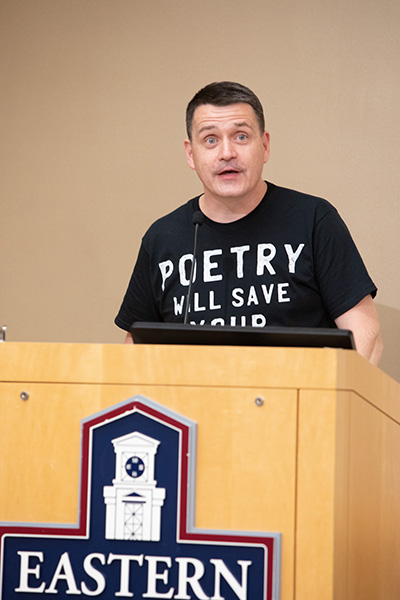- Apply
- Visit
- Request Info
- Give



Published on May 30, 2023
Poet Daniel Donaghy, professor of English, was named the 2023 Distinguished Professor of the Year at Eastern Connecticut State University, affirming his own belief that, “Yes, you can teach poetry writing.”
An award-winning writer himself, Donaghy’s 18-year career teaching creative writing at Eastern has taught him that “there’s a moment when you go all in” and teaching becomes a personal investment.
“It’s a great honor to try to be present for students,” he said.
Eastern President Elsa Núñez, in presenting Donaghy with the Distinguished Professor of the Year award at Commencement, said that “since Dr. Donaghy began in the English Department in 2005, his inspiring poetry and expert teaching have defined his tenure here."
On the first day of his poetry writing class, Donaghy pushes students to get beyond the commonly held belief that their life is uninteresting and they have nothing to write about. They need to acknowledge that, “I have something I need to say to myself,” he said, and to see poetry as giving them a voice. Paraphrasing Robert Frost, he said, the delight comes in saying what we did not know that we know.
On the last day of class, he asks students to bring a photograph from an event in their life and write about it. All the poems are read aloud. One recent student brought in a photo of her family at a lake, but she was not in it. She wrote a poem about being afraid of her family’s reaction to learn that she, or he, as they knew her, was transgender.
“I wept in class, and I wasn’t the only one,” said Donaghy.
By sharing their stories, a community is formed, he said. The current generation of students is “more aware of the dignity of pain of those around them,” he said. Poetry class becomes a safe place to express it. It is an opportunity to “come to a place to wrestle with the world of words.”

Donaghy’s own wrestling began with writing poems for fun when he was in high school. He thought poetry had little to do with his life in Kensington, a tough part of Philadelphia, until poet Etheridge Knight came to his school to read from his book, “Poems from Prison.”
“I got into poetry when he shared his poems about being incarcerated,” he said. Later, as a physics and engineering student at Kutztown University (“I was not crushing the science classes,” he admitted), Donaghy took a writing class with poet Harry Humes, who, like Donaghy, came from a working-class background and wrote about it.
“Humes taught me that those stories had value,” he said. When he turned in a poem that Humes liked, Donaghy said he knew he no longer wanted to be an engineer.
“I had all this energy and now I had a place to put it.”
In 2019, Donaghy’s book of poems about growing up in Kensington, “Somerset,” won the Paterson Poetry Prize sponsored by the Passaic Community College Poetry Center.
Not all his students will become poets, Donaghy knows, but writing poetry helps them recognize “the internal roadblocks that keep us from dreaming.” That will help them in whatever they do, he said. Learning that your voice matters leads to positive change, he said.
Donaghy has brought forth the need for social change with his poems about “lost” history that are often not taught.
“Tulsa Triptych,” his 16-page poem about the Greenwood neighborhood’s destruction in Tulsa, OK, in 1920, when hundreds of Black residents were massacred, was not so much about destruction and hate, but why the White residents who destroyed Greenwood were so hate- and fear-filled, he said.
The poem won the Auburn Witness Poetry Prize. He is working on a new book of poems, “Erasure,” exploring little-known race massacres in Florida and Arkansas. He uses the plural, massacres, for each one, he said, because each person’s death is an atrocity.
The Tulsa poem became the narrative in a collaboration with the Theatre Program on an Eastern theatrical production in 2022, “The Greenwood Project.” That, in turn, spawned a faculty-produced film, “Greenwood: A Dreamland Destroyed,” that is now touring movie festivals in the United States and abroad. That project has inspired Donaghy’s continuing collaboration with theatre faculty and students on stories about racial equity and social justice.
“That’s a really important thing we’ve contributed to the Eastern culture,” he said.
Written by Lucinda Weiss